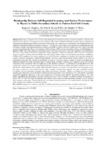| dc.description.abstract | Education is critical to the economic and technological development of many countries around the world. As such, students across all levels of education need to perform well in their academics and play an active role in realization of sustainable development goals (SDG’s) and Kenya vision (2030). This study aimed to establish the relationship between self regulated learning and student performance in physics. The objective of the study was to establish the relationship between motivation strategies and student performance in physics in public secondary schools in Nakuru East Sub-County. The study was based on Structuralist Theory of Learning by Steffe and Gale (1995) and Social Cognitive Theory of Self-Regulation by Bandura (1986). The study adopted correlational design with mixed approaches where both qualitative and quantitative data were concurrently analyzed and triangulated. Target population comprised principals, physics teachers and physics students in public secondary schools in Nakuru East Sub-County. Student sample was determined using Krejcie and Morgan (1990) at 95% confidence level and a sampling error of 5%. Purposive sampling was used for the principals and physics teachers. Research instruments comprised questionnaire, interview guide and document analysis guide in the form of performance proforma table. Piloting of instruments was done in 10% of the schools. Validity was assessed through expert judgment and from the results of the pilot study. Cronbach alpha reliability coefficient was computed to assess the internal consistency of the instruments. The test yielded an overall reliability coefficient, ɤ=0.786 based on standardized items. The results of the study were evaluated using Statistical Package for Social Sciences (SPSS). Descriptive statistics were used to describe the characteristics of the sample while inferential statistics were used to test hypotheses. Cross-tabulations were also done to determine interrelations between study variables. Through data analysis, the study established positive correlations between motivation strategies and student performance in physics. Highest correlations were observed for learning goal orientation; then self-efficacy beliefs and lastly performance goal orientations. The study further established statistically significant differences in the mean performance of learners using different motivation strategies. The study finally established that motivational strategies jointly account for 72.4% of variance in student academic performance in physics (R2 = 0. 724). The study recommended that students need to apply the right motivation strategies so as to optimize their academic achievement. Teachers should also use learner centered method so as to enable learners develop the right skills, attitudes and confidence towards the learning. | en_US |

